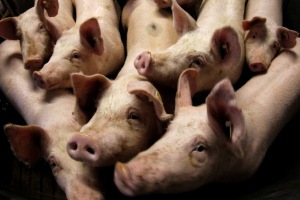Vaccine against various strains of PRRS in Asia

MSD Animal Health (known as Merck Animal Health in the USA and Canada) presented new data showing that MSD Animal Health’s PRRS vaccine is effective against different strains of the PRRS virus in Asia.
The PRRS virus causes reproductive and respiratory disorders in the swine population worldwide and can result in severe economic losses. The vaccine and other swine herd health data were presented at the 6th Asian Pig Veterinary Society Congress held in Ho Chi Minh City, Vietnam from September 23-25.
“Because there are two distinct genotypes of the PRRS virus, there has been uncertainty among many farmers about which strain they should vaccinate against,” said Rika Jolie, DVM, Global technical director, MSD Animal Health. “We are pleased to share data supporting the efficacy of MSD Animal Health’s PRRS vaccine against these different genotypes.”
One study tested the efficacy of MSD Animal Health’s Porcilis PRRS in two Japanese farms endemically infected with the Type 2 strain of the virus. The study found that vaccinated pigs had fewer clinical signs and higher average daily weight gain after being exposed to this strain of the virus, compared to a non-vaccinated control group.
Another study of more than 200 pigs in Thailand compared the effect of Porcilis PRRS and a Type 2 vaccine on levels of the cytokine Interleukin-10, which is reported to increase the severity of clinical disease associated with the PRRS virus. Twenty-one (21) days postvaccination, pigs vaccinated with MSD Animal Health’s Porcilis PRRS had lower levels of IL- 10-producing cells compared to pigs vaccinated with another vaccine and a control group that was not vaccinated.
A Vietnamese study tested the efficacy of MSD Animal Health’s Porcilis PRRS vaccine against two local PRRS field-types that caused losses from death and culling between 41 and 67 percent in 2010. In the study, sows and gilts were vaccinated twice, with four months between doses, and piglets were vaccinated once at 14-21 days old. After vaccination, a subset of pigs were challenged with either the HN10 or DN12 PRRS strain, which originate from North Vietnam and South Vietnam, respectively. The study found that Porcilis PRRS reduced fever, improved daily feed intake, and reduced the severity of microscopic lesions.
An additional study presented at the symposium included serology results from pigs in three Philippine farms. According to the study results, both Type 1 and Type 2 antibodies were present in each of the farms, a significant finding considering that farmers choose PRRS vaccines based on the virus genotype present in their farm.
“Porcine reproductive and respiratory syndrome causes significant losses in the pig industry due to reproductive disorders and growth retardation,” said Robert Barclay, vice president, Asia Pacific, MSD Animal Health.







